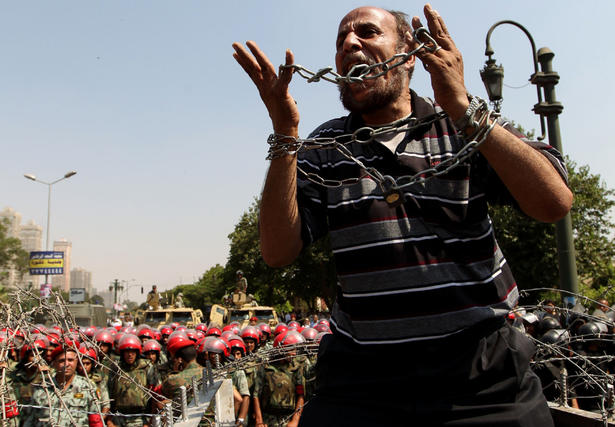![]()
Thu, June 14, 2012 | RubinReports | By Barry Rubin

An Egyptian protester shouts slogans in front of military police during a protest against presidential candidate Ahmed Shafiq outside the Supreme Constitutional Court in Cairo on June 14, after Egypt's top court rejected law barring Shafiq from standing in a tense presidential poll runoff. (MARWAN NAAMANI/AFP/GETTY IMAGES)
The Egyptian Supreme Constitutional Court has just invalidated the parliamentary election there. The parliament, 75 percent of whose members were Islamists, is being dissolved. The military junta has taken over total authority. The presidential election is still scheduled for a few dozen hours from now.
In short, everything is confused and everything is a mess. All calculations are thrown to the wind. What this appears to be is a new military coup. What is the underlying theme? The armed forces concluded that an Islamist takeover was so dangerous for Egypt and for its own interests that it is better to risk civil war, a bloodbath, and tremendous unpopularity than to remain passive and turn over power. I believe this decision was made very reluctantly and not out of some lust for power by the generals. They have decided that they had no choice.
Yes, it is under legal cover, but nobody is going to see it as a group of judges — appointed by former President Hosni Mubarak, remember — looking deep into the law books and coming up with a carefully reasoned decision based on precedent. In theory, this will be seen by every Islamist — whether Salafi or Muslim Brotherhood — and by most of the liberals — who feel closer to the Islamists than to the government — as if the 2011 revolution has just been reversed. In preparation, the army prepared a new regulation allowing itself arrest anyone.
Prediction: massive violence.
Still, there’s something strange going on. So far, the Muslim Brotherhood and Salafists have not reacted so strongly. Is it that they were caught unawares, or want to keep quiet because they think they’ll win the presidential election, or maybe there will be some kind of deal in which the Muslim Brotherhood backs down, most of the parliamentary members will be allowed to stay on, and the military will retain a lot of political power? Everything is up in the air? So far the Brotherhood doesn’t seem so upset by the decision. Why is that?
With typical journalistic “neutrality,” CNN’s Ben Wedeman reported from Cairo: “Those who don’t want to see a return to the oppression of the past … are very unhappy with this ruling.” What about the people who don’t want a radical Islamist regime and a Sharia state to become the oppression of the future?
Still, the fact that the court ruled that “establishment” candidate Ahmad Shafiq can run for president will further a perception that this is a conspiracy to return to the pre-revolutionary situation.
I’m not saying that the armed forces told the justices to make such a ruling. But clearly by backing it up the generals are declaring their willingness to confront the Muslim Brotherhood and Salafists rather than let them take power. Is there a precedent for this? You bet there is:
Algeria.
In 1991 the Islamic Salvation Front was on the verge of gaining victory. Before the second round of voting could be held, the army staged a coup to stop the election. The resulting war lasted more than a decade — in some respects, it’s still continuing today. Cost in lives? About 150,000 — 200,000 in a country whose population was about one-third that of contemporary Egypt. You do the math.
That doesn’t mean Egypt will be the same, but this is something to be taken seriously. Consider:
— The decision virtually wipes out the much-vaunted “Arab Spring” and all the claims that a basic transition was being made in Arab societies. On al-Jazira, for example, the reporters were visibly in a state of shock.
— This event poses a huge problem for the Obama administration — and I’ll bet it caught them by surprise. Does the U.S. government condemn the military and put sanctions on it, demanding that the Muslim Brotherhood be put into power? There is no easy solution. But we are likely to have the strange situation of an American president fighting to put into power an anti-American, anti-Christian, anti-Semitic political force that is opposed to all U.S. interests, because — after all — they did win the election. Once again, Arab leaders have rebelled against Obama’s — and I don’t say this lightly — pro-Islamist policy.
In a first reaction a State Department spokesperson said:
“We want to see the Egyptian people have what they fought for, which is a free, fair, democratic, transparent system of government — governance that represents the will of the people, a parliament so elected, a president so elected.”
That’s predictable and “nice” but it isn’t a policy, much less a strategy, and avoids all of the real issues involved. For example, is the administration going to rush aid to an Egyptian military junta now?
— What if Shafiq wins the presidency? Will the armed forces line up behind him, and put us back in 1952 when the military created a dictatorship and suppressed the Muslim Brotherhood? In other words, the entire “Arab Spring” would have been a temporary detour, and things will return to the path they would have taken if there had been no revolution and an ailing Mubarak was simply replaced in 2011 by the establishment’s choice for president.
— And what if the Muslim Brotherhood’s candidate wins the presidency? Is the military really going to let him rule in any meaningful sense? No. But perhaps the Muslim Brotherhood leaders remember what the army did to their predecessors back in the 1950s and 1960s. Might they back down? “I don’t consider this a military coup,” said Brotherhood presidential candidate Muhammad al-Mursi. “I love the military forces.” He claims that the court decision only knocked out one-third of the members of parliament. This doesn’t seem to be the implication of it but perhaps the Brotherhood and the army could reach a deal.
[Pure speculation here but I wonder if the military’s actions were influenced by secret estimates that a Brotherhood president was about to be elected, too. And how will this event affect a presidential election? On one hand, there might be a reaction against the army leading to a victory for the Brotherhood. On the other hand, though, people might want to be on the winning side and put restored order over the promise of more freedom (albeit, “freedom” within an Islamist regime, which might not look so ideal to a good proportion of Egyptians)].
— If there’s no parliament then there’s nobody to write a Constitution. So parliamentary elections and the writing of a new Constitution are put off by — at the barest minimum — six months and probably for much longer.



 RSS
RSS










Latest Comments
Hello Mike, Thank you for your positive feedback to the article. I felt there wasn’t too much critical analysis of ...
Thanks for this considered and well constructed article. A follow up article on the manner in which the editorial contro...
THE CLUELESSNESS OF CLAIMING THAT OBAMA'S MIDDLE EAST POLICIES WERE A FAILURE CANNOT BE FURTHER FROM THE TRUTH, WHAT THE...
As long as Obama is the president of the usa do not trust the us government......
Thank you for an good read....